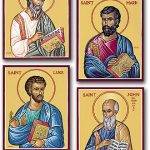Who did Jesus think he was?

If we are to take the four Gospels pretty much at face value (i.e. not as documents whose teaching emanates largely from the faith of the early church, rather than from the Master himself) then we are faced with two complementary, and equally astonishing, sets of truths regarding Jesus’ claims concerning himself.
1. Firstly, there is everything that Jesus did not say or do.
‘Jesus never said to his disciples, Let us worship God together; Let us put our faith in God; Let us pray together; Let us trust or hope in God. Jesus never asked forgiveness from God, nor showed any awareness of sin in his life. He never called God his savior, as though he needed saving. Jesus never even called God Father or God and included his followers. It is always “your heavenly Father; your God” and “my Father; my God.” He never used an expression that includes them, such as our Father, our God, our faith, our trust…When asked by his disciples to teach them to pray, he said to them, “This is how you should pray, our Father …” (Matt. 6:9–13), but he himself never prayed that with them. When he did pray, it was as one wholly apart, as at the transfiguration (Luke 9:28–36).’
2. Secondly, there is everything that he did say and do.
‘When asked about his origin, Jesus said “I am from above… . I am not of this world… . I came from God and now am here… . You are from below… . You are of this world” (John 8:21–23, 42); “I have come down from heaven… . I am the bread that came down from heaven” (John 6:32–42). He who has come down from heaven is the only one who has ever known God (John 6:46) and those who have seen him, have seen the Father (John 14:8–11) because he and the Father are one (John 10:30–33). At another point Jesus startles his hearers by claiming to be the “I Am” who antedated Abraham and spoke to Moses in the desert (John 8:54–59). The Gospel of John also provides a series of supernatural claims by Jesus based on the “I Am” formula—I am the bread of life (6:35), the light of the world (8:12), the gate for the sheep (10:7), the good shepherd (10:11), the resurrection and the life (11:25), the true vine (15:1), and the way, the truth, and the life (14:6). All of these claims are deeply rooted in God’s revelation of himself in the Old Testament and are claims by Jesus to represent deity.’
‘In other instances Jesus exercised God’s authority in forgiving sins (Mark 2:1–12; Luke 7:44–49) and accepted honors that are due to God alone, such as prayer, praise, and worship (Matt. 14:33; 15:25; 21:15–16; 28:9, 17).
The Scriptures were understood by Jesus and the Jews of his day to be the Word of God. Jesus claimed that the Scriptures spoke directly about him (John 5:39) and he was the fulfillment of its prophecies (Luke 4:16–21), indeed of the whole of Scripture (Matt. 5:17).’
‘The temple and the Sabbath represented the highest expressions of God’s presence to the Jewish mind, yet Jesus claimed to be greater than the temple (Matt. 12:6), in his own person being a new temple (Matt. 26:59–61; John 2:19–21), and also the Lord of the Sabbath (Matt. 12:8).’
‘Jesus believed that his words had special, indeed, eternal significance: “Heaven and earth will pass away, but my words will never pass away” (Matt. 24:35). Those who keep Jesus’ words will live forever (John 8:51; 11:26) and those who reject his words will personally be rejected by him (Mark 8:38). Over seventy times Jesus uses a special formula to introduce his words—“Amen, I say unto you.” Ordinarily “Amen” follows a statement or prayer, affirming its truth. In Jesus’ case it comes first, asserting that whatever he said was true, simply because he said it. No one else spoke that way in his time.’
‘Jesus claimed to be the answer to humanity’s deepest needs (Matt. 10:28–30; John 10:10) and that our eternal destiny depends on him (Matt. 7:21–23; Mark 8:34–38). He claims to have power over space (Matt. 18:20) and time (Matt. 28:20) and to possess cosmic significance; bringing about the end of the age (Matt. 24:30–31). He had power over the supernatural forces, both angels (Matt. 26:53) and demons (Mark 5:6–8), and he sent his disciples out with his authority to cast out demons and to heal (Luke 9:1–2).’
‘Jesus offered himself to his generation as the Messiah, God’s special representative (Matt. 11:2–6; 26:62–68; Luke 19:37–40; John 4:25–26). The Book of Daniel (7:13–14) had prophesied a coming supernatural “Son of Man,” whose kingdom would never end and who would be worshiped by all the nations of the world, and Jesus claimed to be that Son of Man (Matt. 16:13–16).’
Elwell, Evangelical Dictionary of Biblical Theology, art. ‘Jesus Christ’